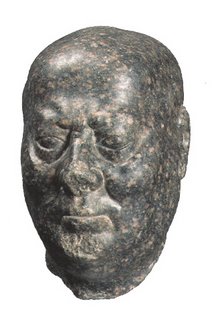 The ancient Egyptians were quite able to do realistic representations, as this bust of an old man shows. Why they didn't do it more often is an interesting mystery.
The ancient Egyptians were quite able to do realistic representations, as this bust of an old man shows. Why they didn't do it more often is an interesting mystery.The generally-understood Egyptian figure is highly stylised, and is pretty much unchanged over a period of thousands of years. That means that thousands of craftsmen were producing almost-identical representations of the people who paid them.
As this exhibition, 'Journey to the Afterlife: Egyptian Antiquities from the Louvre', shows, most of the extant artefacts from this period were used in funeral ceremonies. The gods were ubiquitous and the journey to the afterlife was so perilous that it required considerable preparation, and assistance from the living.
As the gods have become gradually less and less ubiquitous, artists have been freed from the stylistic constraints demanded by their representation. But the Egyptian artists were sometimes called on to show warts and all, as the above bust illustrates. "Statues of people with shaved heads and marked features were in vogue between the 5th and 2nd centuries BCE," says the catalogue. "Sculpted in dark and relatively hard stone, they combined an idealised depiction of the face with features inspired by reality. The irregular shape of the head and the marks of age on the face give these sculptures an unusual presence."
Not only unusual, but frankly striking. While walking among the exhibits, I was startled to come across this piece. It riveted me. So different from the stylised poses and features of most of the other artefacts!
Just goes to show that "reality" is a choice. Everything's postmodern if you look hard enough... now back to my beer.
ReplyDeleteWhat interests me now is that their renderings of animals were always realistic. It's only people who get the stylised treatment.
ReplyDeleteI agree with you about postmodernism. It seems to me to be the logical outcome of romanticism. Once you start questioning the fundamentals of society, it's only a short step then to questioning the way the questions are made.